Rwanda
Rwandan President Paul Kagame has given the strongest hint yet that he could step down after the next elections. The country goes to the polls in August to elect a president and Kagame is widely expected to win by a landslide.
Even though he could stand for a final term in 2024 – that is if he wins the upcoming polls, he told French news portal Jeune Afrique in an extensive interview that 2017 – 2024 mandate could be his last.
‘‘I think so, yes. And it is likely that I will clarify this point soon when I enter the election campaign. There is a sort of contract between me, on the one hand, the RPF party and the Rwandan people, on the other.
‘‘They wanted me, through the constitutional referendum of December 2015, to continue my work, which I accepted. But the time has come to tell them that they must start thinking, beyond my person,’‘ Kagame said in response to stepping down.
Kagame also refuted claims that the entire Rwandan system was built around him and that there were fears that the country could not thrive in his absence. He said there were competent persons in Rwanda and that fears of a collapse in a post-Kagame era were unfounded.
‘‘Things do not work that way. The important thing is that we have built irreversibly and will remain, with or without Kagame. The new generations of Rwandans have incorporated many elements, many different reflections and learned many lessons.
‘‘The fear you express would be justified if the Rwandan society was static, frozen. But it’s just the opposite. Like our economy, our institutions and our skills, our society evolves and enters into a virtuous dynamic. Even if the Rwandan people wanted me to assume leadership for some time, this dynamic will not stop with my departure. Be sure of it,’‘ he stressed.
Possible contenders in August vote
His probable contenders include Frank Habineza, leader of the Green Democratic Party (the only opposition party authorized for four years).
Kagame in response to having a sole opposition party said, as a country of laws and that he as a President was to create an enabling environment for opposition to thrive, all other considerations were legal and out of his ambit.
The only strong contender happens to be a former ruling party member who broke away. Political watchers peg Habineza’s vote tally at about 5%. Kagame won 95% of votes in 2003 and dropped by 2% points to 93% in 2010.
35-year-old Diane Rwigara, the daughter of a businessman who recently announced her decision to contest the polls currently has the headache of sorting out how her nude pictures made it to social media. Many have alluded to the regime’s antics to deflate her ambitions.
The man Paul Kagame – A brief profile
Paul Kagame was born in October 1957 in Rwanda’s Southern Province. His family fled pre-independence ethnic persecution and violence in 1960, crossing into Uganda where Kagame spent thirty years as a refugee.
Kagame joined current Ugandan President Yoweri Museveni and his group of guerrilla fighters to launch a war to free Uganda from dictatorship. Under the new government, he served as a senior military officer.
In 1990, he returned to Rwanda to lead the Rwandan Patriotic Front’s (RPF) four-year struggle to liberate the country from the autocratic and divisive order established since independence.
Led by Kagame, the Rwanda Patriotic Army defeated the government in July 1994 and the RPF subsequently set Rwanda on its current course towards reconciliation, nation building and socio-economic development.
Paul Kagame was appointed Vice-President and Minister for Defense in the Government of National Unity on July 19, 1994, and four years later was elected Chairman of the RPF, a partner in the Government of National Unity.
On 22 April 2000, Paul Kagame took the oath of office as President of the Republic of Rwanda after being elected by the Transitional National Assembly. He won the first ever democratic elections held in Rwanda in August 2003 and was re-elected to a second seven-year mandate in August 2010.
In 2015, two years to this years’ polls which he was not eligible to stand in, he proposed a constitutional referendum which was largely endorsed allowing him to contest in the upcoming elections.



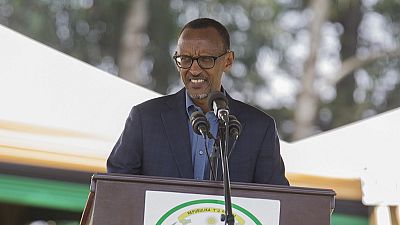

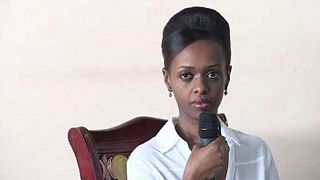
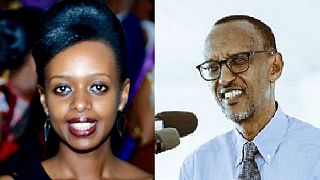
![Rwandan opposition picks presidential candidate [The Morning Call]](https://static.euronews.com/articles/361117/320x180_361117.jpg)
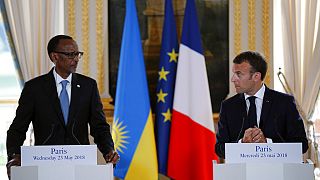
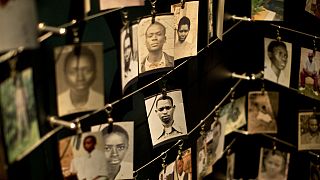
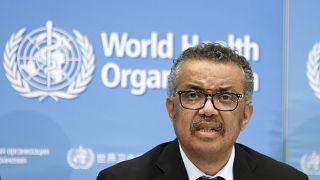



11:05
Africa's hight cost of climate change [Business Africa]
01:16
Ugandan opposition politician kidnapped and jailed, his wife says
01:08
Mozambique: Opposition leader Venancio Mondlane faces legal action
01:10
Senegal parliamentary elections: Polls open, over 7 million expected to vote
01:10
Voters head to polls in Somaliland as leaders hope for global recognition
01:03
Senegal’s legislative elections: Prime minister calls for retaliation against “attacks” on supporter